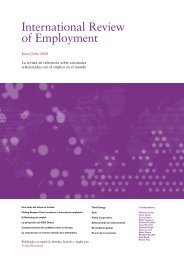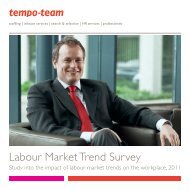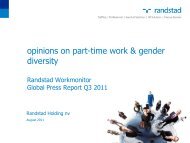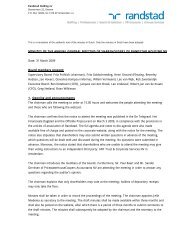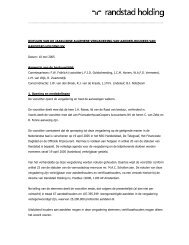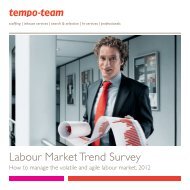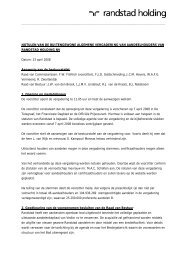randstad international trends and workplace survey report
randstad international trends and workplace survey report
randstad international trends and workplace survey report
You also want an ePaper? Increase the reach of your titles
YUMPU automatically turns print PDFs into web optimized ePapers that Google loves.
practices valuable. In Chile <strong>and</strong> Pol<strong>and</strong>, creating an<br />
environment in which employees learned as well<br />
as taught appeared top of the list of new ways<br />
of working.<br />
1 in 3 companies said they were prepared to h<strong>and</strong>le<br />
different generations in their working environment.<br />
They h<strong>and</strong>led this by implementing different<br />
HR policies. 33% said they were not prepared <strong>and</strong><br />
the remaining 36% did not answer the question.<br />
The most commonly used working policies for the<br />
youngest generation (generation Y) were more<br />
variation in the job by adding different work tasks<br />
(50%), flexible working hours (49%) <strong>and</strong> career<br />
development plans (48%).<br />
Employees belonging to generation X were<br />
offered career development plans (47%), flexible<br />
working hours (42%) <strong>and</strong> different forms of<br />
compensation/benefits (37%).<br />
Top of the list for the more senior generation<br />
(babyboomers) was flexible working hours (42%),<br />
organizing work gatherings to keep older workers<br />
engaged <strong>and</strong> motivated (33%) <strong>and</strong> being part of<br />
mentoring programs (32%).<br />
V Economic impact <strong>and</strong> outlook<br />
The effects for those countries (Argentina, Chile,<br />
Pol<strong>and</strong> <strong>and</strong> Turkey) that had benefited from<br />
the economic upturn predominantly resulted in<br />
the recruitment of employees (49%), extended<br />
hiring (31%) <strong>and</strong> larger budgets (25%). 31%<br />
mentioned that the current economic climate had<br />
had a significant impact on their workload <strong>and</strong><br />
1 in 2 mentioned that company loyalty had been<br />
impacted by changes implemented within the<br />
organization. Recruitment most often occurred<br />
in Sales <strong>and</strong> Operations (both 40%), followed by<br />
Accounting/Finance (38%).<br />
Despite these countries being in an economic<br />
upturn, 36% of all respondents said they believed<br />
the country was currently experiencing the effects<br />
of the global economic situation, while 1 in 3<br />
thought they would be doing so during 2013. Half<br />
of the respondents said they did not anticipate any<br />
economic decline in 2013. 15% said they did expect Andorra<br />
check no 1 market<br />
a decrease, whilst the remainder either did not Angolaposition<br />
know or were doubtful. 17% said that they had Argentina<br />
already implemented a freeze on hiring employees Australia<br />
in 2012 <strong>and</strong> 22% would do so in 2013 or thereafter. Belgium<br />
Brazil<br />
The majority either did not know or did not<br />
answer the question.<br />
The main opportunity that the respondents<br />
had taken advantage of as a direct result of the<br />
economic situation was that they had created new<br />
partnerships, targeted new customer segments,<br />
optimized technologies <strong>and</strong> restructured the<br />
organization.<br />
The consequences for those countries (Greece,<br />
The Netherl<strong>and</strong>s, Spain <strong>and</strong> Switzerl<strong>and</strong>) that had<br />
been impacted by an economic downturn resulted<br />
predominately in budget cuts (62%), cut or frozen<br />
compensations (46%) <strong>and</strong> employee layoffs (40%).<br />
39% mentioned that the current economic climate<br />
global R<strong>and</strong>stad presence<br />
<strong>r<strong>and</strong>stad</strong><br />
<strong>international</strong><br />
<strong>trends</strong> <strong>and</strong><br />
<strong>workplace</strong><br />
<strong>survey</strong> <strong>report</strong><br />
had had a significant impact on their workload<br />
but 73% mentioned that company loyalty had<br />
not been impacted by the changes implemented<br />
within the organization.<br />
Most layoffs occurred in Operations (26%) <strong>and</strong><br />
Sales <strong>and</strong> Accounting/Finance (23%).<br />
Only 7% of the respondents said they were<br />
currently recovering from the economic downfall.<br />
1 in 4 believed they would recover during 2013<br />
but the majority, with 68%, thought this would<br />
be after 2013. Remarkably, the majority, with<br />
39%, anticipated growth in 2013. 24% believed<br />
there might be a possibility for expansion within<br />
Canada<br />
Germany Japan<br />
New Zeal<strong>and</strong> Spain<br />
Turkey<br />
France Germany Greece Hungary India Italy Japan Luxembourg Malaysia Mexico Mozambique Netherl<strong>and</strong>s<br />
Chile<br />
Greece Luxembourg Norway<br />
Sri Lanka United Arab Emirates<br />
China & New Hongkong Zeal<strong>and</strong> Norway Hong Pol<strong>and</strong> Kong Portugal MalaysiaSingapore<br />
Slovakia Pol<strong>and</strong> Spain Sri Lanka Sweden Switzerl<strong>and</strong> United Kingdom<br />
Czech Republic Hungary Turkey Mexico United Arab Emirates Portugal United Kingdom United Switzerl<strong>and</strong> States UruguayUnited<br />
States<br />
Denmark<br />
India<br />
Mozambique Singapore<br />
Thail<strong>and</strong> Uruguay<br />
France<br />
Italy<br />
Netherl<strong>and</strong>s Slovakia<br />
(August 2011)<br />
a year <strong>and</strong> 28% of the respondents said that they<br />
did not foresee any growth within the next year.<br />
1 in 3 respondents were currently hiring (project)<br />
employees <strong>and</strong> 26% would do so during 2013.<br />
46% of the companies showed concern with<br />
regard to an increase in job turnover as the<br />
economy picks up again. Positively, the economic<br />
crisis allowed 59% of all respondents to negotiate<br />
better terms with their supplier, encouraged their<br />
employees to think differently (44%), restructured<br />
their organization (40%) <strong>and</strong> created new partnerships<br />
(37%).<br />
8 R<strong>and</strong>stad <strong>international</strong> <strong>trends</strong> No. <strong>and</strong> 1 <strong>workplace</strong> market position <strong>survey</strong> <strong>report</strong> 2013 R<strong>and</strong>stad <strong>international</strong> <strong>trends</strong> <strong>and</strong> <strong>workplace</strong> <strong>survey</strong> <strong>report</strong> 2013<br />
9<br />
Major positions in Argentina, Australia, Chile, France, Greece, Italy, Japan, Mexico, Spain, Switzerl<strong>and</strong>, UK, United States<br />
2013<br />
Andorra Angola Argentina Australia Belgium Brazil Canada Chile China / Hong Kong Czech Republic Denmark<br />
N = 1,001





